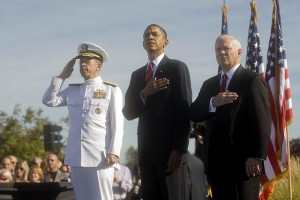
It has been 10 years since Sept. 11. Americans and countless others across the globe have spent those years dealing with the memories and repercussions of the attack.
Rather than encouraging Americans to look on the past with a fresh perspective, government officials are proposing ways of framing reactions and memories.
On Aug. 30 the White House released two documents (one for domestic use and one for those abroad) outlining how government officials should commemorate the 10th anniversary of 9/11.
I am glad the government put such thought into honoring the victims of 9/11 and is encouraging Americans to volunteer and reach out to other nations who have been hurt by terrorist attacks.
I’m proud of America for not only reflecting on the past but also looking towards the future and encouraging community and global fellowship.
The anniversary of 9/11 should be a time to remember those who were lost on that day. It should provide a chance for us to consider our individual actions towards our neighbors as well as the actions taken by our country before and after the attacks.
It should be a time for silent reflection but also for conversation, community, discussion and enlightenment.
However, these reflections should not be impeded by the way our government wants to frame our thoughts on the attacks.
Though the government cannot force its citizens to present a certain story of 9/11, the fact that the government would suggest a perspective places limits on our freedom to think independently.
By planning out how Americans should perceive Sept. 11, the government is taking away the people’s right to think about and deal with the attacks on their own terms.
The 9/11 attacks and their subsequent anniversaries are not events the government should be able or attempt to manipulate. Creating and distributing the 9/11 Anniversary Planning – as the domestic guidelines are termed – makes the whole event seem scripted, detached and regulated.
The document given to embassies and consulates abroad declares its intent to “present a positive, forward-looking narrative.”
By using the words “present” and “narrative,” the White House appears to be shaping how we felt 10 years ago and in the years since in order to present a specific front to the rest of the world.
The government is saying there is a correct way to remember and piece together the emotions surrounding 9/11. Americans came together and relied upon one another in the aftermath of the attacks, but each individual lived through unique experiences and emotions. The American people should be able to reflect on the events of 9/11 and their impact and then come to their own conclusions rather than be told how to think about those events.
A stronger narrative could emerge if the government did not promote a certain way of thinking about and remembering the Sept. 11 attacks.
